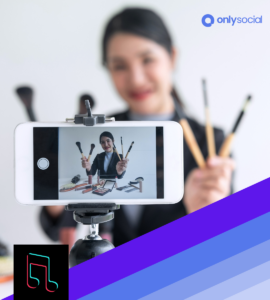In the digital age, where online presence is as crucial as real-world interactions, Personal Branding on Social Media has emerged as a fundamental strategy for professionals, entrepreneurs, and creatives alike. It’s the art of crafting and managing your online persona to accurately reflect your values, skills, and passions. With billions of people scrolling through social media daily, these platforms offer a vast stage to showcase your unique story and connect with like-minded individuals, potential collaborators, and customers.
Unlike traditional branding, which companies primarily use to appeal to a broad audience, personal branding on social media focuses on the individual, emphasizing authenticity and relatability. It’s about leveraging the power of social networks to build a reputation that resonates with your personal and professional goals, thereby opening doors to opportunities that were once beyond reach. This guide dives into the nuances of personal branding on social media, offering insights and strategies to help you navigate this evolving landscape with confidence and purpose.
Table of Contents
Understanding Personal Branding

What is Personal Branding?
Personal branding is the deliberate effort to create and influence public perception by positioning yourself as an authority in your industry, elevating your credibility, and differentiating yourself from the competition. It involves carefully curating and conveying your values, beliefs, talents, and goals across various platforms, with a significant focus on social media. Personal Branding on Social Media is not just about being popular; it’s about being known for what you stand for and how you can offer value to your audience.
The Evolution of Personal Branding
Trace the journey of personal branding from traditional methods to the digital age, highlighting how social media has transformed the way individuals can build and scale their personal brands. This evolution has democratized branding, making it accessible to anyone with internet access and a story to tell.
The Importance of Personal Branding on Social Media
Discuss why personal branding on social media is crucial in today’s digital world. Cover aspects such as career advancement, networking opportunities, personal development, and the potential to become a thought leader in one’s field. Emphasize how a strong personal brand can open doors to opportunities and create a lasting impact on one’s professional and personal life.
Components of a Strong Personal Brand
- Authenticity: Being genuine and transparent in your communications and actions.
- Consistency: Regularly updating your social media profiles with content that reflects your brand.
- Value Proposition: Clearly articulating what you offer that’s different or better than others.
- Engagement: Building relationships with your audience by engaging in meaningful conversations.
- Visibility: Utilizing various social media platforms to ensure your brand is seen by a wider audience.
Personal Branding Mistakes to Avoid
Outline common pitfalls in personal branding on social media, such as inconsistency, neglecting engagement, oversharing, or failing to define a clear niche. Offer insights on how to navigate these challenges effectively.
The Role of Social Media in Personal Branding
Delve into the specific role that social media plays in personal branding, discussing how different platforms can be leveraged for various aspects of branding. For instance, LinkedIn for professional networking, Instagram for visual storytelling, and Twitter for engaging in industry conversations.
By understanding the foundational elements of personal branding on social media, individuals can begin to craft a persona that not only resonates with their audience but also drives their personal and professional goals forward. This section sets the stage for deeper exploration into how to effectively build and manage one’s brand in the digital realm.
Crafting Your Personal Brand on Social Media

Defining Your Brand Identity
Start by introspecting on what makes you unique. Identify your strengths, passions, values, and the professional niche you want to occupy. This foundation is crucial for personal branding on social media, as it guides the content you create and share, and the way you interact with your community. Discuss how to articulate your brand identity through a compelling narrative that resonates with your target audience.
Choosing the Right Platforms
Not all social media platforms will be relevant to your personal brand. This subsection should guide the reader through selecting the most effective platforms based on where their audience spends the most time and the nature of their content. Whether it’s LinkedIn for professional networking, Instagram for a more visual appeal, or Twitter for engaging in industry-specific conversations, choosing the right platforms is critical.
Creating Consistent Visual and Voice Branding
Consistency in visuals and voice helps in making your brand recognizable across all social media platforms. This includes using the same profile picture, bio, and color scheme, as well as maintaining a consistent tone in your posts and interactions. Offer practical tips on how to achieve this consistency and why it matters for personal branding on social media.
Content Strategy for Personal Branding
Detail the importance of having a content strategy that aligns with your brand identity and audience’s interests. Discuss different types of content (educational, inspirational, behind-the-scenes) and the importance of storytelling in making your brand relatable and engaging. Highlight how to plan content creation and scheduling to maintain a steady and relevant presence on social media.
Engaging with Your Audience
Engagement is key to building and sustaining relationships with your followers. Provide strategies for engaging effectively with your audience, such as responding to comments, participating in relevant conversations, and leveraging polls or Q&A sessions. Emphasize how engagement not only boosts your visibility but also helps in understanding your audience better, which is essential for successful personal branding on social media.
Measuring Success and Adapting Your Strategy
Introduce methods to track the performance of your personal branding efforts on social media. Discuss metrics such as engagement rates, follower growth, and content reach. Explain how to use this data to refine and adapt your strategy over time for continuous improvement.
Crafting your personal brand on social media is an ongoing process that requires patience, consistency, and adaptability. This section equips readers with the knowledge and tools needed to start this journey, emphasizing the importance of authenticity and strategic planning in achieving personal branding success.
Content Creation and Management for Personal Branding on Social Media

Developing a Content Calendar
A content calendar is essential for organizing and planning your posts in advance. This ensures a consistent and strategic approach to content creation, which is vital for personal branding on social media. Discuss the benefits of using a content calendar, including how it can help you maintain a balanced mix of content types, align posts with key dates or events, and avoid last-minute scrambles for content ideas.
Content Types and Formats
Explore the variety of content types and formats that can enhance your personal brand, such as blog posts, videos, infographics, live streams, and stories. Each format has its unique advantages and can cater to different segments of your audience on various platforms. Offer guidance on how to choose the right type of content that aligns with both your brand’s message and your audience’s preferences.
Visual Branding in Content
Highlight the importance of visual elements in reinforcing your personal brand identity across social media. Discuss how to use colors, fonts, and imagery that reflect your brand’s style and values. Offer tips on creating or selecting high-quality visuals that capture attention and convey your message effectively.
Crafting Engaging and Valuable Content
Engagement and value are the cornerstones of successful content. Provide insights into how to craft content that not only grabs attention but also provides real value to your audience. This could include sharing your expertise, offering solutions to common problems, or inspiring your followers with your personal journey. Stress the importance of storytelling and authenticity in making your content relatable and memorable.
Content Optimization for Social Media
Discuss strategies for optimizing your content for social media to increase its reach and engagement. This includes using relevant hashtags, optimizing post timings based on when your audience is most active, and incorporating calls-to-action (CTAs) that encourage interaction. Also, cover the role of SEO in content creation, especially for platforms like LinkedIn and YouTube, where content can be searched.
Managing and Repurposing Content
Managing your content effectively can save time and enhance your personal brand’s presence across social media. Discuss techniques for repurposing content across different platforms, adapting it to suit each platform’s unique format and audience. Additionally, cover strategies for content archiving and recycling, ensuring that valuable content continues to reach new audiences over time.
Analyzing Content Performance
End with the importance of regularly analyzing your content’s performance to understand what resonates with your audience. Explain how insights gained from analytics tools can guide your content strategy, helping you to fine-tune your approach and improve the effectiveness of your personal branding on social media efforts.
Content creation and management are crucial aspects of building and maintaining a strong personal brand on social media. This section provides readers with comprehensive strategies for producing, optimizing, and managing content that aligns with their brand identity and resonates with their target audience, ensuring their personal branding efforts are successful and sustainable.
Personal Branding Pitfalls to Avoid
Navigating the landscape of Personal Branding on Social Media can be complex and challenging. While there are numerous strategies to elevate your personal brand, there are also common pitfalls that can undermine your efforts. Being aware of these can help you maintain a positive and professional online presence.
Lack of Consistency
One of the most common mistakes in personal branding is inconsistency in messaging, posting frequency, and visual identity across different social media platforms. Inconsistency can confuse your audience about who you are and what you stand for. Highlight the importance of maintaining a consistent brand voice, aesthetic, and content schedule to build trust and recognition.
Neglecting Engagement
Ignoring or underestimating the power of engagement with your audience can significantly impact the effectiveness of your personal brand. Engagement is not just about responding to comments or messages; it’s about building relationships. Discuss the risks of neglecting engagement and provide tips on how to actively participate in conversations, show appreciation for your community, and create content that encourages interaction.
Over-Promotion
While self-promotion is a part of personal branding, overdoing it can turn your audience away. This section should explore the balance between sharing your achievements or services and providing value to your audience through informative, educational, or entertaining content. Offer strategies to avoid the pitfall of over-promotion, emphasizing the importance of value-driven content.
Ignoring Audience Feedback
Feedback, whether positive or negative, is invaluable for personal branding on social media. Ignoring feedback can make your brand seem aloof or out of touch. Address the significance of listening to your audience, adapting based on their feedback, and the role of constructive criticism in refining your personal brand.
Inauthenticity
Attempting to present an image that is not true to your real self or values is a critical mistake in personal branding. Inauthenticity can eventually erode trust and credibility. This part should stress the importance of authenticity in building a genuine connection with your audience and how being true to yourself is key to long-term branding success.
Failing to Adapt and Evolve
The digital landscape and social media trends are constantly changing. A static approach to personal branding can lead to stagnation. Highlight the importance of staying informed about new trends, platforms, and technologies, and being willing to adapt your strategy to stay relevant and engaged with your audience.
Avoiding these pitfalls is crucial for anyone looking to build or enhance their personal brand on social media. This section not only warns of the common mistakes but also guides on how to navigate the complex world of personal branding with integrity, authenticity, and strategic foresight.
Advanced Personal Branding Strategies
As you become more comfortable with the basics of Personal Branding on Social Media, it’s time to explore advanced strategies that can further differentiate and elevate your brand. These tactics require a deeper understanding of social media dynamics and a more nuanced approach to content creation, audience engagement, and brand positioning.
Leveraging Multimedia Content
Diversify your content strategy by incorporating a variety of multimedia formats, such as videos, live streams, podcasts, and infographics. Discuss the power of video content in storytelling and building a personal connection, the engagement potential of live streams, and how podcasts can position you as an industry thought leader. Offer insights into the best practices for creating compelling multimedia content that aligns with your personal brand.
Strategic Collaboration and Networking
Highlight the importance of building strategic partnerships and collaborations with other influencers, brands, and professionals in your field. Explain how collaborations can extend your reach, bring new perspectives to your content, and add value to your audience. Discuss networking techniques on social media platforms, including engaging with peers’ content, joining relevant groups or forums, and participating in industry conversations.
Personal Brand SEO
Search Engine Optimization (SEO) isn’t just for websites. Explain how to optimize your social media profiles and content for search engines to increase visibility and attract a targeted audience. Cover keyword optimization in your bio, posts, and hashtags, as well as the importance of backlinking to your social profiles from your website or blog.
Utilizing Analytics for Personal Brand Growth
Deep dive into the use of analytics tools provided by social media platforms to track the performance of your content and understand your audience’s behavior. Discuss how to interpret data such as engagement rates, follower growth, and content reach to refine your branding strategy. Provide tips on setting measurable goals and using insights to make data-driven decisions for content creation and audience engagement.
Thought Leadership and Content Authority
Establish yourself as a thought leader by sharing original insights, industry analyses, and forward-thinking perspectives. Discuss the role of authoritative content in strengthening your personal brand and how to leverage your expertise to create valuable, shareable content that positions you as a go-to source in your field.
Personalized Engagement Tactics
Elevate your engagement strategy by personalizing interactions with your audience. Discuss advanced tactics like hosting Q&A sessions, creating community challenges, or offering exclusive content to followers. Highlight the importance of personal touches in building a loyal community and enhancing your brand’s relatability and appeal.
These advanced personal branding strategies on social media require a more sophisticated approach but offer significant rewards in terms of brand visibility, audience engagement, and professional opportunities. Implementing these tactics will not only bolster your brand but also set you apart as a leader and innovator in your field.
BONUS
streamline your social media strategy and ensure your brand shines across all platforms, consider leveraging OnlySocial’s Post Planning and Scheduling function. This powerful tool allows you to plan, schedule, and publish your content across unlimited social networks seamlessly. With the ability to manage unlimited social profiles and enjoy unlimited posting, OnlySocial enables you to maintain a consistent and impactful online presence. By scheduling your posts in advance, you can ensure your brand remains vibrant and engaging, even during your busiest times. Sign up now for a commitment-free 7-day trial today.
Frequently Asked Questions
What is personal branding on social media?
Personal branding on social media refers to the process of creating a distinctive online identity that reflects your values, skills, and passions. It involves strategically using social media platforms to communicate your story, connect with your target audience, and build your professional network.
Why is personal branding on social media important?
A2: Personal branding on social media is crucial for establishing credibility, increasing visibility, and differentiating yourself in a crowded digital landscape. It allows individuals to showcase their expertise, attract opportunities, and build meaningful relationships online.
How do I start personal branding on social media?
Start by defining your brand identity, including your values, strengths, and the unique value you offer. Choose the right social media platforms where your target audience is active. Consistently create and share content that aligns with your brand, engage with your audience, and be authentic in your interactions.
How often should I post on social media for effective personal branding?
The frequency of posts can vary depending on the platform and your audience’s preferences. However, consistency is key. Develop a content calendar to maintain a regular posting schedule, aiming for a balance that keeps your audience engaged without overwhelming them.
Can personal branding on social media lead to job opportunities?
Absolutely. A strong personal brand on social media can attract recruiters, hiring managers, and industry leaders, opening doors to job opportunities. It showcases your expertise, work ethic, and personality, making you a compelling candidate.
How can I measure the success of my personal branding efforts on social media?
Measure success by tracking engagement rates, follower growth, and the quality of interactions (e.g., comments, shares, direct messages). Tools and analytics provided by social media platforms can offer insights into how your content is performing and how your brand is growing.
What are some common mistakes in personal branding on social media?
Common mistakes include lacking consistency in posting and messaging, failing to engage with the audience, being overly promotional, neglecting to adapt to feedback, and not being authentic. Avoiding these pitfalls is crucial for building a strong personal brand.
How important is visual branding in personal branding on social media?
Visual branding is incredibly important as it helps create a memorable and recognizable online presence. Consistent use of colors, logos, and imagery across your profiles can reinforce your brand identity and make your content stand out.
Should I use my personal social media accounts for branding, or create new ones?
It depends on your goals and the current state of your personal accounts. If your existing accounts reflect your professional interests and are appropriate for your desired audience, you can use them. Otherwise, creating new accounts specifically for branding purposes might be more effective.
How can I protect my personal brand on social media?
Protect your brand by being mindful of the content you share, engaging professionally, monitoring your online presence, and addressing any negative feedback or misinformation promptly and tactfully. Establishing clear boundaries between personal and professional content is also key.




